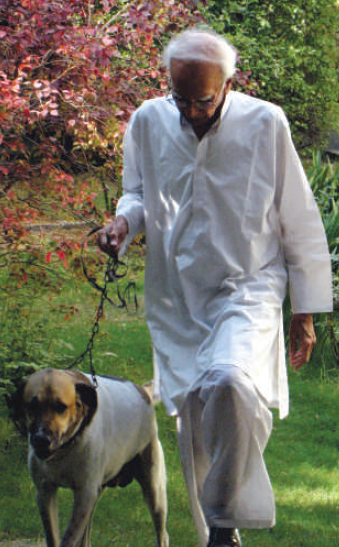Mobashir Hassan
This is a collection of articles archived for the excellence of their content. Readers will be able to edit existing articles and post new articles directly |
Mobashir Hassan
By Professor Bhabani Sen Gupta
India Harmony VOLUME - 1 : ISSUE - 5 JULY-AUGUST, 2012
Mobashir Hassan belonged to the other eminent family of scholars from Panipat. The family emigrated to Pakistan but maintained close links with India. He has spent a lifetime trying to improve Indo-Pak relations.
Man creates history even as history creates man. The credit for the great boost democracy and the rule of law received on that sunlit December morning goes, of course, to the millions of Pakistanis who kept the flame of democracy alive and flickering even during long sunless spans of military rule. There are, however, two outstanding individuals who luminate the great event of December 17 which may make another military takeover much more difficult than the three Army coups of 1958, 1977 and 1996. One of them is Iftikar Choudhry, the Chief Justice of Pakistan, whose determined fight for an independent judiciary and his final victory have installed him as, perhaps, the brightest icon of (he country's struggle for democracy- Chief Justice Choudhury's historic role found rich consummation in his ability to carry the entire Bench with him to deliver the great judgment on December 17.
The other luminous icon of democracy in Pakistan is the 87-year old Mobashir Hassan, of Lahore, who filed the petition at the Supreme Court challenging the legality of the National Reconciliation Ordinance and mobilized a team of competent lawyers, headed by Abdul Latif Pirzada, also of Lahore, to plead successfully for the historic verdict. Janab Mobashir Hassan's birthplace and the soil that first nourished his personality, his thinking and his commitment is Panipat in Haryana.
I knew that the Pakistan People's Party was born in 1969 at Mobashir's house in Lahore and that he was Finance Minister in the first cabinet of Zulfikar Ali Bhutlo. I also knew that he did not agree with ZAB's handling of the turn of events that ended with the separation of East Pakistan from Pakistan and its incarnation as Bangladesh. Mobashir had told me that he stayed on with ZAB mainly because among the political leaders of Pakistan he alone was committed to the urban and rural poor and the lower middle classes.
On one of my visits to Lahore, Mobashir took me around the city's sprawling slums where lived the poor; and I saw how the people of these urban slums loved and respected him. Mobashir used to enlighten me about the inner dynamics of the Republic of Pakistan; tell me about the emotional traumas the Pakistanis had gone through; and about the basic contradictions of Pakistani society. He would often talk about the "bleeding sense of betrayal" the people of Pakistan felt at the three military coups – how the politicians had let down the people, and how convinced he was that the great hiatus between democracy and military dictatorship was the basic fault line of the State and Sociely of Pakistan.
Few Pakistani personalities are known to Indians except in the narrow restricted context of nationalism and religion, and the mutually exclusive relationship between what Kuldip Nayar appropriately described as “distant neighbours”.
Mobashir has been quoted as saying that while he shared the happiness of the people of Pakistan and of many other countries with the historic Supreme Court verdict, he knew the political system well enough to doubt if it would lead to a genuine reordering of the country. “The people of Pakistan are extremely happy, so I am happy too." he said, "But since I know the reality, I do not entertain the hope that this will stop the State of Pakistan from falling apart." Mobashir hurried to explain that he believed that when corruption became the System, the State fell apart.
Mobashir Hassan is a civil engineer who earned his Ph.D from Columbia University. His own life is an example for the people of Pakistan who, In their own way, have been fighting their battles for democracy and a humane social and economic order. He belongs, as I also do, to the generation in the subcontinent that witnessed the end of the Empire, and the launching of our respective republics. However, our political systems carry a lot of the dirt and filth that gathered in the huge belly of the Empire. India has done relatively well, because of its democratic political process built on institutional foundations- It was Pakistan's misfortune that it lacked strong political institutions and leadership. From the start, power was usurped by the bureaucracy. And even in the 1950s, the ruling bureaucracy joined hands with the Army to lord it over the political parties and their leaders.
If Mobashir Hassan were a student of history and took a deep look at the political history of nations and peoples, he would perhaps be less pessimistic and share the popular jubilation of the Supreme Court verdict of December 21. The nations of Europe took more than a century; fought countless wars including two World Wars in 25 years; while enriching themselves from their worldwide empires, before they attained the mature stability of the last sixty years. Besides— and this is a matter of supreme importance—the Europeans slit themselves into a cluster of countries with small populations compared with the countries of Asia. When Asia changes, half of humanity changes. Even after losing its eastern wing, Pakistan is home to over 168 million people-the second largest Muslim country in the world after Indonesia— while Germany and France, the two most populous countries of the continent of Europe, have only 82 and 64 million people.
